
The tale of the founding of Rome is recounted in traditional stories handed down by the ancient Romans themselves as the earliest history of their city in terms of legend and myth. The most familiar of these myths, and perhaps the most famous of all Roman myths, is the story of Romulus and Remus, twins who were suckled by a she-wolf as infants. Another account, set earlier in time, claims that the Roman people are descended from Trojan War hero Aeneas, who escaped to Italy after the war, and whose son, Iulus, was the ancestor of the family of Julius Caesar. The archaeological evidence of human occupation of the area of modern-day Rome dates from about 14,000 years ago.
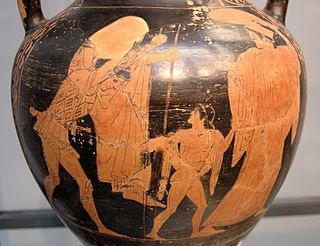
Ascanius was a legendary king of Alba Longa and is the son of the Trojan hero Aeneas and Creusa, daughter of Priam. He is a character in Roman mythology, and has a divine lineage, being the son of Aeneas, who is the son of the goddess Venus and the hero Anchises, a relative of the king Priam; thus Ascanius has divine ascendents by both parents, being descendants of god Jupiter and Dardanus. He is also an ancestor of Romulus, Remus and the Gens Julia. Together with his father, he is a major character in Virgil's Aeneid, and he is depicted as one of the founders of the Roman race.
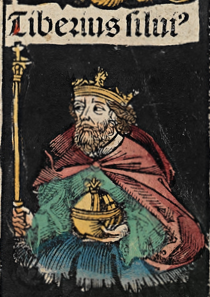
Tiberinus was the ninth king of Alba Longa, according to the traditional history of Rome handed down by Titus Livius. He was the successor of Capetus, the eighth king of Alba Longa. The Alban kings claimed descent from Aeneas, a Trojan prince who brought a remnant of the Trojan populace to Italy following the sack of Troy, and settled in Latium. Alba was built by Ascanius, the son of Aeneas and Lavinia, and founder of the Alban royal line. The Alban kings, including Tiberinus, bore the cognomenSilvius, after the son of Ascanius, who was said to have been born in the woods.

In Roman mythology, King Numitor of Alba Longa, was the maternal grandfather of Rome's founder and first king, Romulus, and his twin brother Remus. He was the son of Procas, descendant of Aeneas the Trojan, and father of the twins' mother, Rhea Silvia, and Lausus.
Procas or Proca was one of the Latin kings of Alba Longa in the mythic tradition of the founding of Rome. He was the father of Amulius and Numitor and the great grandfather of Romulus and Remus, Rome's legendary founders.

Tullus Hostilius was the legendary third king of Rome. He succeeded Numa Pompilius and was succeeded by Ancus Marcius. Unlike his predecessor, Tullus was known as a warlike king who according to the Roman Historian Livy, believed the more peaceful nature of his predecessor had weakened Rome. It has been attested that he sought out war and was even more warlike than the first king of Rome, Romulus. Accounts of the death of Tullus Hostillus vary. In the mythological version of events Livy describes, he had angered Jupiter who then killed him with a bolt of lightning. Non mythological sources on the other hand describe that he died of plague after a rule of 32 years.
Queen Gwendolen, also known as Gwendolin, or Gwendolyn was a legendary ruler of ancient Britain. She is said to have been queen during the 11th century BC.
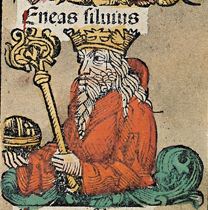
Aeneas Silvius is the son of Silvius, in some versions grandson of Ascanius and great-grandson, grandson or son of Aeneas. He is the third in the list of the mythical kings of Alba Longa in Latium, and the Silvii regarded him as the founder of their house. Dionysius of Halicarnassus ascribes to him a reign of 31 years. Ovid does not mention him among the Alban kings. According to Livy and Dionysius, the heir of Aeneas Silvius was named Latinus Silvius.

Latinius Silvius was the fourth descendant of Aeneas and fourth in the list of mythical kings of Alba Longa. Titus Livius credits him with founding a majority of the settlements in Latium. It is, however, unclear if this person ever existed.

Capetus or Capetus Silvius (Latin: Căpĕtŭs Sĭluĭŭs) was a descendant of Aeneas and one of the legendary Latin kings of Alba Longa. He was the son of Capys, and the father of Tiberinus, after whom the Tiber river was named.
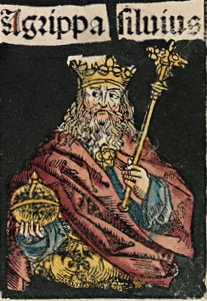
In Greco-Roman mythology, Agrippa was a descendant of Aeneas and King of Alba Longa, the capital of Latium, southeast of Rome. He was listed as king of Alba Longa in the time of Augustus. Some speculate that this was done in order to give prestige to Augustus' friend and son-in-law Marcus Vipsanius Agrippa. He was also ancestor of the legendary founders of Rome, Romulus and Remus.
The Albans were Latins from the ancient city of Alba Longa, southeast of Rome. Some of Rome's prominent patrician families such as the Julii, Servilii, Quinctii, Geganii, Curiatii and Cloelii were of Alban descent.

The kings of Alba Longa, or Alban kings, were a series of legendary kings of Latium, who ruled from the ancient city of Alba Longa. In the mythic tradition of ancient Rome, they fill the 400-year gap between the settlement of Aeneas in Italy and the founding of the city of Rome by Romulus. It was this line of descent to which the Julii claimed kinship. The traditional line of the Alban kings ends with Numitor, the grandfather of Romulus and Remus. One later king, Gaius Cluilius, is mentioned by Roman historians, although his relation to the original line, if any, is unknown; and after his death, a few generations after the time of Romulus, the city was destroyed by Tullus Hostilius, the third King of Rome, and its population transferred to Alba's daughter city.

Alba Silvius was in Roman mythology the fifth king of Alba Longa. He was the son of Latinus Silvius and the father of Atys. He reigned thirty-nine years.
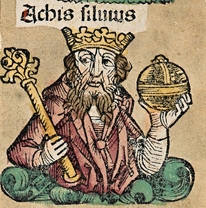
In Roman mythology, Atys was a descendant of Alba and the sixth king of Alba Longa. Geoffrey of Monmouth asserted in his Historia Regum Britanniae that Silvius succeeded Alba at the same time that Solomon began to build the Temple in Jerusalem and was visited by the Queen of Sheba, and king Leil of Britain founded Carlisle.
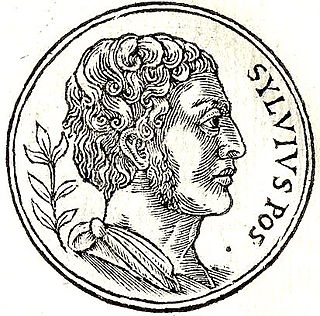
In Roman mythology, Silvius, or Sylvius,, or Silvius Postumus, was either the son of Aeneas and Lavinia or the son of Ascanius. He succeeded Ascanius as King of Alba Longa.

Alba Longa was an ancient Latin city in Central Italy, 12 miles (19 km) southeast of Rome, in the vicinity of Lake Albano in the Alban Hills. Founder and head of the Latin League, it was destroyed by the Roman Kingdom around the middle of the 7th century BC, and its inhabitants were forced to settle in Rome. In legend, Romulus and Remus, founders of Rome, had come from the royal dynasty of Alba Longa, which in Virgil's Aeneid had been the bloodline of Aeneas, a son of Venus.
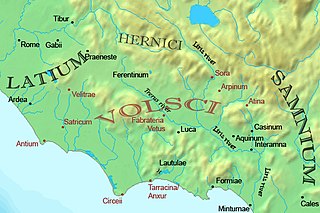
The Latins, sometimes known as the Latians, were an Italic tribe which included the early inhabitants of the city of Rome. From about 1000 BC, the Latins inhabited the small region known to the Romans as Old Latium, that is, the area between the river Tiber and the promontory of Mount Circeo 100 km (62 mi) southeast of Rome. Following the Roman expansion, the Latins spread into the Latium adiectum, inhabited by Osco-Umbrian peoples.
The gens Silvia was a minor plebeian family at ancient Rome. According to legend, the Silvii were the royal dynasty of Alba Longa, Rome's mother city, and presumably came to Rome when that city was destroyed by Tullus Hostilius in the seventh century BC. Notwithstanding their connection with Rome's foundation myths, the Silvii were plebeians, and hardly any members of this gens played a significant role in history. However, from inscriptions, several Silvii appear to have had distinguished military careers, and Silvius Silvanus was governor of Moesia Inferior in the time of Diocletian.















